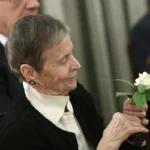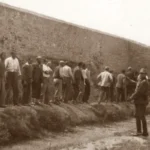Source: The Sydney Morning Herald
Epidemiologists warn a rule requiring Victorian shoppers to wear masks indoors should not be scrapped this week given growing Christmas crowds and uncertainty about the severity of the Omicron strain.
Premier Daniel Andrews announced last month a requirement for retail customers to wear masks would be lifted by Thursday unless there was a significant jump in hospitalisations.

Mask rules expected to be scrapped in Victoria retail stores
Victorian shoppers are expected to be able to ditch face masks within days with the state government slated to ease restrictions.
However, this public assurance is now under a cloud, with state government officials refusing to comment on whether it will proceed as planned, citing the legal requirements of the new pandemic laws.
Victoria’s state of emergency powers expire at 11.59pm on Wednesday and will be replaced by the government’s new pandemic laws. The first major announcement of coronavirus restrictions under the legislation is expected in the coming days, but whatever is announced, epidemiologists say that the mask-wearing rule should stay for now.
University of South Australia epidemiologist Professor Adrian Esterman said “with Omicron rearing its ugly head, and especially for people who are due for their booster and haven’t had it yet, it would be very sensible for people to continue wearing face masks in retail settings until we know whether Omicron is more severe than Delta”.
Deakin University epidemiology chair Catherine Bennett said she would not be surprised if the government decided to delay the end of mandatory masks for shoppers, given what was already known about the Omicron strain, which is thought to more infectious than Delta.
She pointed to a growing cluster at a Newcastle nightclub, one of the largest known transmission events of the virus in Australia, now linked to more than 80 cases of the variant of concern.
Professor Bennett added that if the government did decide to ditch the mask rule, it may end up forcing more people into quarantine.
“The Health Department, in assessing who are close contacts, will make that ring a bit wider if no one’s wearing masks and they’re indoors with people they don’t know,” she said.
“Whereas if we leave masks on, the compromise might be that even if there’s an exposure, you’re less likely to get caught up in being asked to quarantine over Christmas.
“So maybe [retaining masks] is the better of two strategies.”
Under the pandemic laws, Chief Health Officer Brett Sutton’s current directives will be replaced by new public health orders that will instead be signed off by the Premier and Health Minister Martin Foley.
The changes give Mr Andrews and Mr Foley the power to enforce restrictions – such as mask wearing – and make pandemic declarations.
Currently, Victorians must wear masks in all retail settings, but not in hospitality venues. Face coverings will remain mandatory in high-risk settings and workplaces, and on public transport for the foreseeable future.
Mr Andrews said on November 18 that unless the state’s health services reported a “significant jump in hospitalisations”, retail customers would no longer be required to wear masks after December 15 – in line with NSW settings.
Victorian hospitals were flooded with a surge of coronavirus hospitalisations that peaked in October, but admissions have since declined and then stabilised alongside high vaccination rates.
When Mr Andrews released the statement announcing the potential easing of the mask mandate in shops on November 18, there were 337 Victorians in hospital with coronavirus, compared with 323 who remain in hospital this week.
Professor Bennett said she did not expect mandates banning the unvaccinated from restaurants, non-essential stores and other venues to be relaxed at the moment because of the risk COVID-19 case numbers would further increase.
However, she said she thought it was unnecessary to apply those rules to those aged 12 to 15, as is currently the case.
Asked whether it would be safe to ease any existing coronavirus restrictions, including scrapping controversial vaccine mandates as criticism grows of rules forcing people to prove their vaccination status in shops, Professor Esterman advised against it.
“We know Omicron is already in Victoria and until we know how bad it is I’d be inclined not to change anything just yet.“
The Age contacted the Health Department, the Premier’s office and the office of Mr Foley, but was unable to get clarity on what restrictions will be eased on Thursday.
“Victorians have done an incredible job coming forward to get vaccinated, enabling businesses to be open and everyone to get back to things they love,” a government spokesman said. “We’ll have more to say on future settings soon.”












